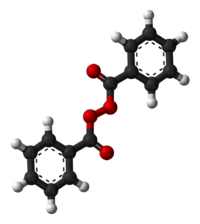Benzoyl peroxide acne treatments are based on the antiseptic and bleaching properties of this potent substance. For teenagers and adults alike it is considered safe to use benzoyl peroxide for acne treatment, if you suffer from mild to moderate forms of acne. This substance can be used in combination with topical ointments or oral acne medications for a more severe manifestation of this skin disorder.
When used for treating the symptoms of acne, benzoyl peroxide comes in cream or gel forms, requiring direct application on the affected skin areas several times a day, depending on the product’s concentration. It is generally considered that the best concentration for an acne treatment using benzoyl peroxide as the main ingredient ranges between 2.5% and 5%, although lots of products use concentrations up to 10%.
The drawback of the creams that come in a higher concentrations is that they are linked to side effects like skin dryness and irritation, which are quite common for these types of treatments. But on the other hand, benzyol peroxide acne remedies are able to relieve the existing symptoms and to prevent future outbreaks, so it’s very important to be familiar
with both the benefits and disadvantages of these products before deciding whether they suit you or not.
How do benzyoyl peroxide acne creams work?
The main benefits of using benzoyl peroxide for acne are its anti-inflammatory properties, its ability of reducing sebum production and its efficiency in destroying harmful bacteria on the skin’s surface. This substance has been shown to help in unclogging skin pores by clearing the dead cells from the follicles and removing the acne-causing bacteria.This ingredient is a great oxidizing agent, which introduces oxygen molecules into the clogged parts of the skin pores, preventing bacterial overgrowth. This makes it more difficult for pathogens to spread, so the frequency of acne outbreaks is considerably diminished. Also, as a result of the oxidizing action of benzoyl peroxide, acne pimples and blemishes are reduced after two to three weeks of constant use.
On the other hand, this substance doesn’t stimulate the immune system thus it doesn’t increase the body’s ability of fighting against harmful bacteria. This means that even if the signs and symptoms of this skin disorder disappear, the chances for a future outbreak are still high so in people affected by recurrent episodes of acne, benzoyl peroxide treatments should be combined with specific remedies that target the acne-causing bacteria or other potential triggers of this health issue.
Working as a peeling agent, benzoyl peroxide increases skin turnover, so even if it triggers certain unpleasant reactions such as redness, drying and flaking at the beginning, these manifestations generally disappear once the skin develops tolerance to the chemical treatment. To help your body get used to this substance quicker, you can rely on different types of products containing this ingredient, as it is proven that lower concentrations (2.5%-5%) are just as effective as higher ones but cause less irritations. The alternative products you can use besides creams containing benzoyl peroxide for acne symptoms reduction are: soaps and foams, body lotions and gels, facial masks and washes as well as medicated scrubs rich in this ingredient.
If your symptoms continue to manifest after 5 to 6 weeks of constant application of benzoyl peroxide acne products, you should see your physician to be prescribed a more powerful treatment. Antibiotics like salicylic acid, erythromycin or Clindamycin as well as synthetic retinoids like Adapalene are prescribed in such cases.
Potential Adverse Reactions Caused by Benzoyl Peroxide Acne Treatment
This substance commonly causes irritation and dryness of the skin when used for the very first time and sometimes it is accompanied by a burning sensations and itching in people with more sensitive skin. Still, these side effects can be easily avoided by using a lower concentration or a smaller amount of benzoyl peroxide cream until the body gets used to the active ingredient in these acne products. The dryness and redness can be reduced by applying an oil free moisturizer on the skin areas affected by acne. Benzoyl peroxide gels can also lead to contact dermatitis and other allergic reactions. This can be managed by discontinuing the treatment immediately and applying a mild topical cream based on steroids like Hydrocortisone.Other unpleasant effects associated with benzoyl peroxide acne treatments include the increased production of free radicals, which are known to favor premature skin aging and the potential for skin injuries appearing in people using this product for prolonged periods. Both these reactions can be avoided by limiting the duration of the treatment.
For more beauty,Fashion and health care tips visit http://www.sumaiqa.com
Skin Care Products and Advise http://www.life.sm4.biz

No comments:
Post a Comment